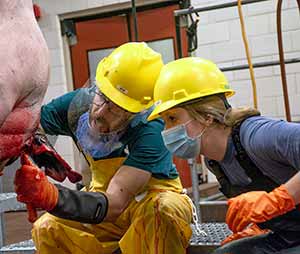
Ditching laptops and donning rubber boots and coveralls, University of Wyoming students prep within five minutes for class.
This isn’t the standard dress for COVID-19 precautions but for class on the UW Meat Laboratory kill floor.
This is just one of the many courses McKensie Harris, an assistant lecturer and internship program coordinator for the UW Department of Animal Science, teaches in the fall semester.
“The livestock slaughter practicum class is just that,” says Harris, in the UW College of Agriculture and Natural Resources. “It’s a place where students can develop skills in the animal harvest industry.”
During Phase 1 and Phase 2 of UW’s approach to reopening this semester, the class was taught online with an academic focus providing students virtual lectures on principles of animal handling, food safety and meat science.
During Phase 3, when all students were allowed back on campus, the class went right to work in the UW Meat Lab.
“McKensie did a great job during those first four weeks to prepare us to hit the ground at full speed,” says Ben Herdt, a student in the class from Laramie and manager in the academic advising office with the UW Advising, Career and Exploratory Studies Center. “When I went in that very first day of in-person instruction, I suited up and was on the meat lab kill floor within five minutes going to work, and that’s a tribute to the preparation we were doing in the weeks before.”
For three weeks, the class will use hands-on learning to harvest a pig, then focus for three weeks of beef harvest and round out the class with two weeks of lamb harvest.
“The class has been one of my favorite courses, I think, because it’s so hands-on,” says Brittany Vogl, a sophomore in the class from Elizabeth, Colo. “The first day, McKensie said, ‘We are going to be here, we are going to help you every step of the way, but we aren’t doing it for you.’”
Students work with the animal from the beginning -- when it comes into the facility as a live animal -- and to the end -- preparing and putting the carcass in the freezer.
As a UW staff member, Herdt has the opportunity to take classes. A co-worker who has kids in 4-H and raises animals recommended this course to him.
“I really enjoy cooking,” Herdt says. “I enjoy cooking meat, and I enjoy the idea that we need to become more connected to the food we eat. So, that’s what really drew me toward the class.”
He also says taking a variety of different classes helps him get better at his job. He generally works with first-year students who are either academically at risk or undeclared and need guidance on what courses to take.
“It helps me be better at my job if I take an undergraduate class because it keeps me connected to what they are experiencing,” Herdt says.
He explains his job requires him to be a generalist. He needs to know what is generally offered around campus because students often don’t know what’s out there until they talk to someone who has tried it before.
“It’s nice to find these little corners of campus where really great things are happening,” Herdt says. “I’m super impressed with what McKensie is doing, and with what Kyle (Phillips, UW Meat Lab manager) and Warrie (Means, associate dean and associate professor in meat science) are doing. Their whole corner of campus is very impressive.”
The class was required for Vogl’s major in animal science, with a concentration in production, meat and food technology, but she wanted to step out of her comfort zone.
“I was intimidated but, after seeing the process a few times, I feel way better,” Vogl says. “If someone were to approach me in the grocery store and say, ‘How could you eat meat? It’s unethical,’ this course will give me a stronger platform to combat that and have experience to back up my thoughts.”
Vogl says that the class was a lot of hard work but, with proper technique, anyone can harvest an animal.
“Ag can be a very male-dominated industry but, for a woman to take interest in it, is a really big deal,” Vogl says. “Many of the practices we learned require a lot of strength, and you would normally associate that with a man. What McKensie has taught us is all about technique. It doesn’t matter what you look like, who you are or what your gender is. It’s all about technique and how you do it.”
Both Herdt and Vogl believe they are gaining a greater understanding of the livestock slaughter process. They would recommend the course to others who are interested in this area of study and like hands-on learning.
“The community the meat lab provides to those students is great,” Herdt says. “Those are the kinds of communities we need. That community supports those students so much, and their persistence and retention are going to be so much better.”

